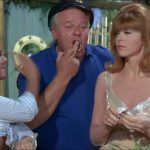He Had Humble Origins
Many Hollywood stars are born into a life of fame, but the same cannot be said for Sam Shepard. He was born in Fort Sheridan, Illinois on November 5th, 1943. His father was named Samuel Shepard Rogers, Jr., and he led quite an interesting life of his own. He worked as both a teacher and a farmer, but he also served during World War II as a bomber pilot for the United States Air Force. Unfortunately, he was also a severe alcoholic, which took a toll on young Sam. His mother, Jane Elaine was born and raised in Chicago, but she moved to Fort Sheridan with her husband and settled down as a teacher before starting a family.
At first, it seemed as though Sam would follow in his parents’ rural footsteps. As a teenager, he took up work on a ranch, and after graduating high school, he attended Mt. San Antonio College to study animal husbandry.
He Gave up a Simple Life
Sam Shepard would have no doubt been perfectly content pursuing a rural career path, but his experiences in college would change everything. After all, college is a time for great personal growth and change. Sam Shepard became introduced to something that stirred a passion deep within; art. He became obsessed with Samuel Beckett, a skilled playwright and novelist. He also grew deeply intrigued by both abstract expressionism and jazz. After realizing just how much there was he didn’t know about art, Sam knew it was time to leave the life he thought he wanted. He dropped out of college and joined a touring theatre group called Bishop’s Company. He fell more and more in love with the art form, and before long, he moved to New York to study theatre even more.
His Early Days
Theatre is an incredibly competitive field, and not many can simply drop everything and become successful as an actor or director. Sam Shepard was determined, however, to make a name for himself. He found his place in a theatre company in New York called La MaMa Experimental Theatre Club. They loved his work, and in 1964, he wrote his first play, Cowboys. Many more of his early works would be performed at LaMaMa, and Sam Shepard grew as a writer and as a theatre maker. Between 1964 and 1971, he wrote a total of sixteen plays. One of his earlier science fiction plays, The Unseen Hand, was later cited as being an important inspiration for the cult classic music The Rocky Horror Picture Show. Despite his humble origins, it seemed that Sam’s talent was taking him to new heights.
The Golden Years
Between 1966 and 1984, Sam Shepard one a total of ten Obie Awards, the most prestigious award you can win for off-Broadway and off-off-Broadway theatrical work. Sam Shepard was the first person to ever win as many as ten Obie Awards. Even many decades later, he still holds the record for most Obie Awards ever won. In his so-called “golden years,” Sam Shepard wrote numerous amazing plays. Some of his most famous being Buried Child, True West, and A Lie of the Mind.
In 1979, his play Buried Child won the Pulitzer Prize for Drama. His name became legendary among theatre lovers across the nation, and his career only seemed to be growing greater. Of course, as sad as it is, nothing can last forever. We’re covering the tragic ending of Sam Shepards career in just a few minutes. Before we get to it, be sure to like this video and subscribe to the channel.
Work as an Actor
Many names, no matter how famous within the theatre community, fail to make a stand in the rest of the world. However, Sam Shepard was an exception, because he also worked successfully as an actor. In 1978, he made his debut as a film actor in the movie Renaldo and Clara, which he also co-wrote. That very same year, he was cast in a more conspicuous role in the film Days of Heaven. In 1982, he was cast alongside Jessica Lange in the movie Frances, and despite his marriage to O-Lan Jones, he fell in love. Before long, he divorced his wife and moved in with Jessica. He continued to act until, in 1983, he was cast as the role of Chuck Yeager in the film The Right Stuff. His performance earned him a nomination for the Academy Award of Best Supporting Actor.
Giving Back as a Teacher
As we mentioned earlier, both of Sam Shepard’s parents were teachers. In the later years of his career, Shepard decided to do the same, albeit in a less traditional way. He taught young and budding actors, playwrights, and directors to help them hone their craft. His goal was to shape, influence, and inspire a new generation of theatre makers, and he was incredibly successful. Even while he was busy directing and writing, he always made time to give lectures and workshops across the country. He was frequently made a guest speaker at countless festivals and conventions.
Working to the Very End
Sam Shepard was a notoriously hard worker, constantly filling his schedule with anything and everything related to his craft. In the early 2000s, he began to suffer from burn-out, but he became interested in acting on film once again in 2001, when he was cast in the film Black Hawk Down. From there, he began acting even more frequently, appearing in films like Blackthorn and Fair Game. Becoming a senior citizen didn’t stop Sam Shepard from working at all; in fact, he seemed to work even harder the older he got. The final film he appeared in was Never Here as the role of Paul Stark. He worked on the film in 2014, but it wasn’t released until after his death in 2017.
A Tragic End, but a Hopeful Legacy
Sadly, later in his life, Sam Shepard was diagnosed with amyotrophic lateral sclerosis, also known as ALS or Lou Gherig’s disease. People diagnosed with this degenerative neurological condition are usually only given between 2 and 4 years left to live after its onset. As symptoms worsened, Sam Shepard was no longer able to continue doing the work that he so loved. He died on July 27th, 2017 at 73 years old. Had he not been a victim of ALS, he probably would have accomplished so much more in his life. Still, his legacy lives on in the form of his plays, movies, and the people he influenced and taught.
What was your favorite moment of Sam Shepard’s career? Tell us which of his plays or films you liked the most in the comments! And be sure to subscribe to Facts Verse for more videos like this.


